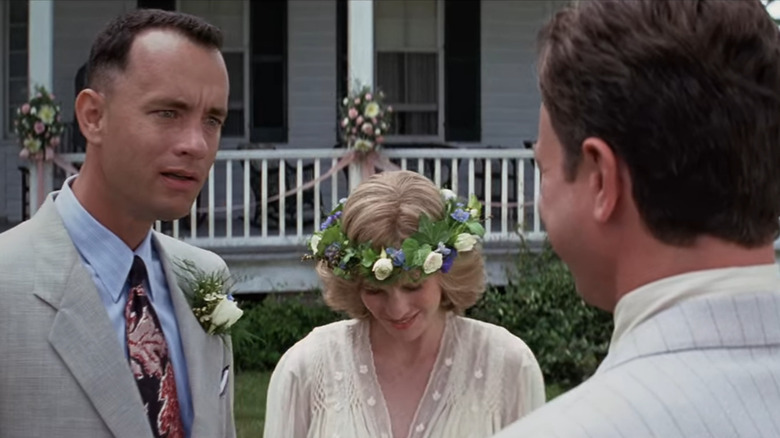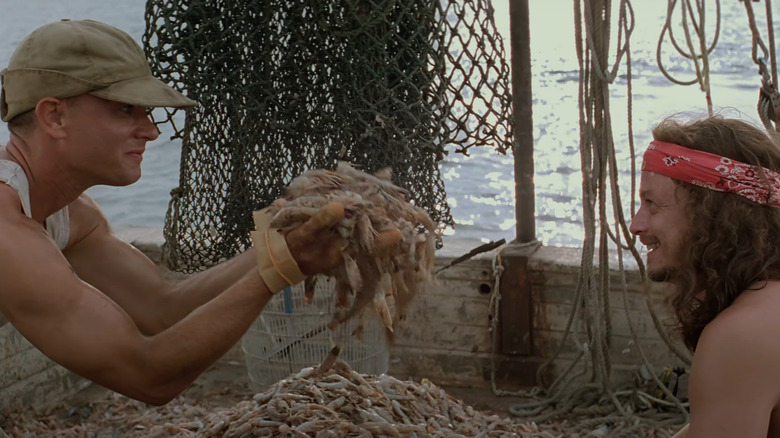Tom Hanks Pinpoints One Line In Forrest Gump That Gives The Film 'Undeniable Heartbreaking Humanity'
The reputation of "Forrest Gump" is a fascinating case study of evolving cultural attitudes. Robert Zemeckis' comedy drama was seemingly so well-received on its 1994 release, it made it hard to discern any dissent amid the seemingly unending praise. The film made $679 million at the global box office and garnered six Oscar wins, becoming a cultural phenomenon and introducing multiple phrases into the popular lexicon.
But over time, attitudes towards the film have changed, or at least become more varied, and for good reason. Like the floating feather that opens the movie, Gump is merely shunted from one experience to another throughout — exhibiting no real agency and representing a kind of tourist of existence. Reflecting on the film some 25 years after its release, Indiewire's Eric Kohn opined that Gump is little more than a "[know]-nothing white man" who "becomes a war hero and a wealthy man simply by chugging along, participating in a country that dictates his every move."
And it wasn't just Kohn that contributed to the reappraisal of "Forrest Gump." Even before he decried the protagonist's uncritical ride through the 20th century, Entertainment Weekly surmised in 2004 that, far from being a universal hit, the movie was viewed as either "an artificial piece of pop melodrama" or "sweet as a box of chocolates." As with anything that has the kind of cultural impact this movie did, people are bound to turn on it in time. But if you ask the film's star, he'll tell you any criticism of the movie is just a result of its mega-success, and actually "Forrest Gump" is an unmitigated delight — especially at one crucial point.
The moment of 'heartbreaking humanity'
By now almost everyone knows the story of Tom Hanks' dim-witted protagonist. At one point, he ends up in the Vietnam War in a platoon led by Gary Sinise's Lieutenant Dan Taylor, who promptly has his legs blown off in a skirmish. Gump saves him, after which the lieutenant descends into alcoholism, resenting his savior for not letting him die. But by the end of "Forrest Gump," Lieutenant Dan has cleaned up his act and arrives at Gump's wedding to his longtime love, Jenny (Robin Wright), having been fitted with titanium alloy legs — or what Gump calls "magic legs"
And according to Hanks, this moment proves the film isn't the "artificial piece of pop melodrama" many have claimed. In an interview with The New York Times, he was asked about whether the movie "overcame its nostalgic impulses or succumbed to them," and here's how Hanks responded:
"Oh, it overcame them [...] there is a moment of undeniable heartbreaking humanity in 'Forrest Gump' when Gary Sinise — he's playing Lieutenant Dan — and his Asian wife walk up to our house on the day that Forrest and Jenny get married [...] I might get weepy thinking about it now. Forrest and Lieutenant Dan in those four words — 'magic legs; Lieutenant Dan' — understand all they had been through and feel gratitude for every ounce of pain and tragedy that they survived. That's some intangible [expletive] right there."
It's not just Hanks that thinks "Forrest Gump" is more than a mawkish melodrama. Reflecting on the making of "Forrest Gump," in the audio commentary, Robert Zemeckis said:
"What I found compelling about the story was it was this story about all different types of love. Love between friends, between mother and sons, son and mother, romantic love, friendship, [...] it had all this great stuff."
The problem with Forrest Gump
"Forrest Gump" does have a lot of great stuff in it. But there is something undeniably bizarre about a film that features a frankly absurd series of events that simultaneously tries to present an honest exploration of genuine human emotion. For me, like Zemeckis says, the movie had real moments of poignancy. But the overall effect was undermined by the improbable nature of the story. You believe the love story between Forrest and Jenny, which at times is affectingly tender. But when it's contrasted against CGI John Lennon and a life story that sees Gump just lucky enough to be present at almost every major event in 20th century American history, it just starts to ring hollow.
You could argue that these wildly contrasting tones are trying to capture the full spectrum of life experience, but even that is undermined by how outlandish many of the moments in the movie are. It seems to me that either you're going to explore the realities of human emotion, or you're going to use your central character's life story as a way of reliving and reckoning with mass social and political events of the 20th century. Combining those things seem to undermine each one's effect. That's the real issue with the film, not the fact that, as Tom Hanks claimed, it "made a billion dollars," and caused a backlash. But while Hanks is technically wrong on that front (he was likely just exaggerating to make a point), he's kind of right in saying it had "a moment of undeniable heartbreaking humanity." In fact, there's several of them throughout the movie. It's just that they often ring hollow when wedged between Gump's larger, implausible journey.


